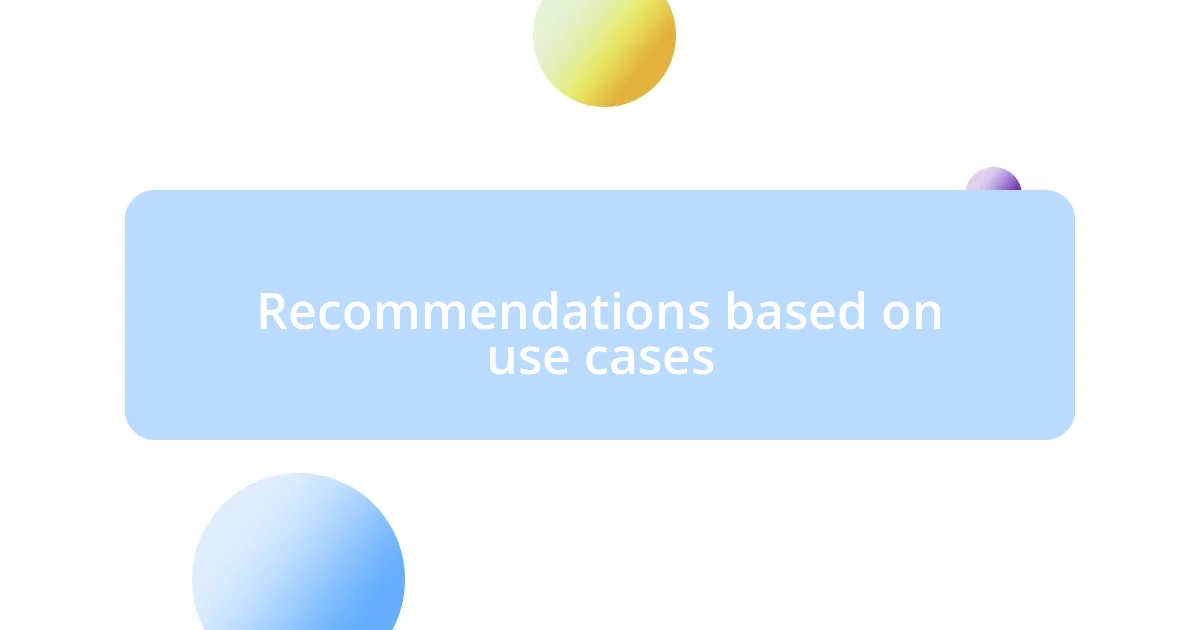Key takeaways:
- cPanel’s user-friendly interface and one-click installers simplify website management and enhance the user experience, making it ideal for beginners.
- Robust security features, including SSL management and automated backups, provide peace of mind for users concerned about data protection and recovery.
- While cPanel excels for shared hosting and eCommerce, alternatives like Plesk may offer greater flexibility for larger, more complex server setups.

Overview of cPanel features
cPanel is a powerful web hosting control panel that streamlines the management of websites. One feature I find particularly impressive is its user-friendly interface, which makes navigating through various options feel intuitive—even for those who aren’t technically inclined. Have you ever felt overwhelmed by complex software? With cPanel, that frustration fades away as everything is organized and accessible.
One standout feature is the one-click installer for various applications. I vividly remember my first experience using it; I was able to set up WordPress within minutes, which was a game changer for my blogging journey. It’s like having a magic button for launching your favorite tools. Isn’t it exciting when technology just works in your favor?
Additionally, cPanel offers robust security features, including password protection and SSL certificate management. I’ve always believed that security is not just an option but a necessity. How comforting is it to know that cPanel has taken great strides in making sure your data is protected against threats? It’s a major relief for anyone managing multiple sites or sensitive information.

Comparison with other panels
When comparing cPanel to other panels like Plesk or DirectAdmin, I notice distinct differences that can really impact user experience. For me, one significant advantage of cPanel is its extensive documentation and community support. When I encountered a technical hurdle with another panel, I felt lost—trying to sift through sparse resources. That’s when I realized how valuable a strong support system can be.
Here’s a quick comparison I’ve drawn based on my experiences and knowledge:
- User Interface: cPanel’s intuitive layout often wins over users, while other panels can seem cluttered and overwhelming.
- Application Installers: I found cPanel’s one-click installers far easier to navigate than those in DirectAdmin, which made my setup process feel like a breeze.
- Community Support: The active cPanel community is a lifesaver. In contrast, I felt a bit stranded when I was using other less-supported panels.
- Resource Management: I noticed that cPanel offers clearer resource monitoring tools, allowing me to keep a closer eye on website performance compared to some alternatives.
It’s interesting how these little details can make such a big difference in my day-to-day management of sites, highlighting why I gravitate towards cPanel over other options.

User experience in cPanel
The user experience in cPanel is something I truly appreciate. The layout is clean, and features are easy to locate, which resonates with my need for efficiency. I remember a time when I was juggling multiple sites, and the last thing I wanted was to waste time searching for essential tools. With cPanel, I felt like I had everything at my fingertips, significantly reducing my stress levels.
I’ve had my moments struggling with other panels, especially when upgrades or changes left me perplexed. One time, I found myself stuck trying to figure out how to manage email accounts on a less intuitive platform. In contrast, cPanel made this a breeze for me; the detailed dropdowns and organized sections offered clarity. That seamless navigation felt almost soothing—like a well-planned road map, guiding me through my site management tasks.
Furthermore, I genuinely appreciate the responsiveness of cPanel’s interface. It’s quick and reacts smoothly to my clicks, which can be a game changer when I’m in the zone working on projects. Have you ever had a clunky panel slow you down during a critical task? I felt that frustration many times with other options, but cPanel hasn’t let me down, allowing me to maintain my focus on what truly matters—growing my online presence.
| Feature | cPanel | Other Panels |
|---|---|---|
| User Interface | Intuitive and organized | Cluttered and sometimes confusing |
| Application Installers | One-click and user-friendly | Less straightforward |
| Community Support | Active and helpful | Sparser resources |
| Navigation Speed | Responsive and quick | Can be sluggish |

Cost analysis of hosting panels
When it comes to the cost analysis of hosting panels, I’ve learned there’s often more than just the sticker price to consider. For example, while cPanel might have a higher initial licensing fee compared to alternatives like DirectAdmin, I find that its robust feature set often translates to better value in the long run. Think about it: how many times have you faced a major issue and wished you had a support network or additional tools at hand?
In my own experiences, I’ve encountered hidden costs with other panels that initially seemed cheaper. Take Plesk, for instance. While its base price is attractive, adding on features like additional domains or even certain security measures can quickly inflate expenses. Have you ever been surprised by unexpected charges when switching between panels? I know I have, and it’s left me feeling a bit frustrated, wishing for a more transparent pricing structure.
Ultimately, it’s essential to assess not just the upfront costs but also what you can expect over time. I firmly believe that investing in a panel like cPanel provides a peace of mind that you simply can’t put a price on. The capacity to efficiently manage multiple sites without the worry of escalating costs or lack of support feels invaluable, doesn’t it? It’s these experiences that lead me to feel that, for my needs, the long-term savings and smooth operations of cPanel outweigh any initial financial hesitations.

Performance metrics of control panels
When evaluating the performance metrics of control panels, one metric that stands out to me is the load time of the interface. I remember trying to set up a new site on a panel that lagged painfully during peak traffic times. It was maddening! cPanel’s speed is a game changer, allowing me to execute tasks without frustration when every second counts. Hasn’t there been a time when even a few extra moments felt like an eternity?
Another crucial aspect is the resource efficiency of these panels. I vividly recall managing a server with a less optimized control panel that drained resources unnecessarily, leading to sluggish site performance. With cPanel, I’ve noticed it utilizes resources wisely, which keeps my sites running smoothly even when I’m tackling multiple tasks. I can’t stress enough how vital this is for maintaining a seamless user experience.
Lastly, I’ve observed that cPanel excels in error handling and reporting. Early in my journey with website management, I faced a critical error on a different panel that left me scratching my head. In stark contrast, cPanel’s clear error messages and actionable suggestions made troubleshooting feel almost manageable. It’s like having a knowledgeable friend by your side, guiding you through the murky waters of tech hiccups. Have you experienced that sense of being lost without clear direction? I know that feeling all too well, but cPanel’s approach has changed the game for me.

Security features in cPanel
cPanel shines in its security features, which is something I truly appreciate. One of its standout aspects is the built-in SSL management. I remember when I first started securing my sites—a confusing process with other panels. With cPanel, I simply check a box, and voila, my site is protected! It’s a small thing, but having SSL readily available without extra steps feels like a real security blanket.
Another feature that often gets overlooked is the IP Blocker. It’s saved me a few headaches after I noticed some suspicious activity on my site. Being able to block specific IP addresses directly from the control panel gave me a sense of control that I didn’t have with other platforms. Have you ever felt uneasy about malicious traffic? I know that sense of vulnerability all too well. Fortunately, cPanel’s intuitive controls put my mind at ease.
Moreover, I value cPanel’s automated backup system. One moment that sticks with me was when I accidentally deleted vital site files while experimenting with new plugins. My heart dropped! Fortunately, I had enabled automatic backups in cPanel—restoring everything was a breeze. I can’t stress enough how reassuring it is to know that essential files are just a few clicks away, ready to be retrieved when mistakes happen. Does your current panel offer such peace of mind? If not, maybe it’s time to reconsider.

Recommendations based on use cases
When it comes to shared hosting environments, I’d strongly recommend cPanel for those just starting out. I remember the overwhelming feeling I had when managing my first shared server. The intuitive layout of cPanel made navigation a breeze, even for a newbie. Have you ever wondered how much simpler your hosting experience could be with the right tools?
For larger, more complex setups, such as VPS or dedicated servers, I find that alternatives like Plesk can sometimes offer more flexibility. I had a project where I needed to run multiple applications without conflict; Plesk’s ability to manage different environments really shone through. It’s not that cPanel isn’t capable, but having that level of customization felt like a breath of fresh air.
When considering eCommerce platforms, my advice leans heavily towards cPanel again, especially for WordPress sites. I recall a time when a plugin update crashed my online store, and thankfully, cPanel’s one-click restore feature saved the day. Can you imagine the stress of losing sales because of a technical mishap? With the right panel, that stress can truly be minimized.














